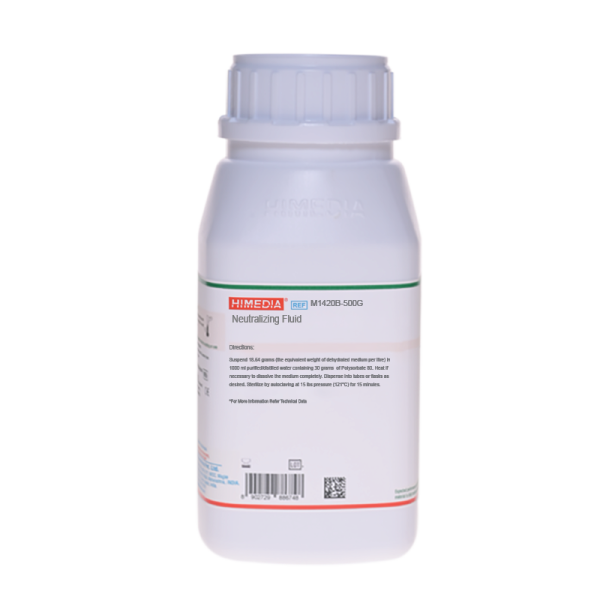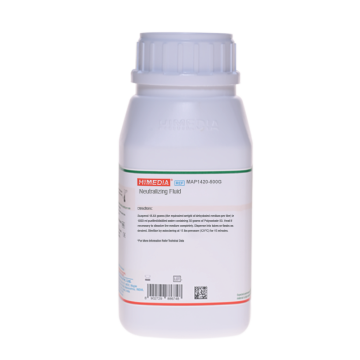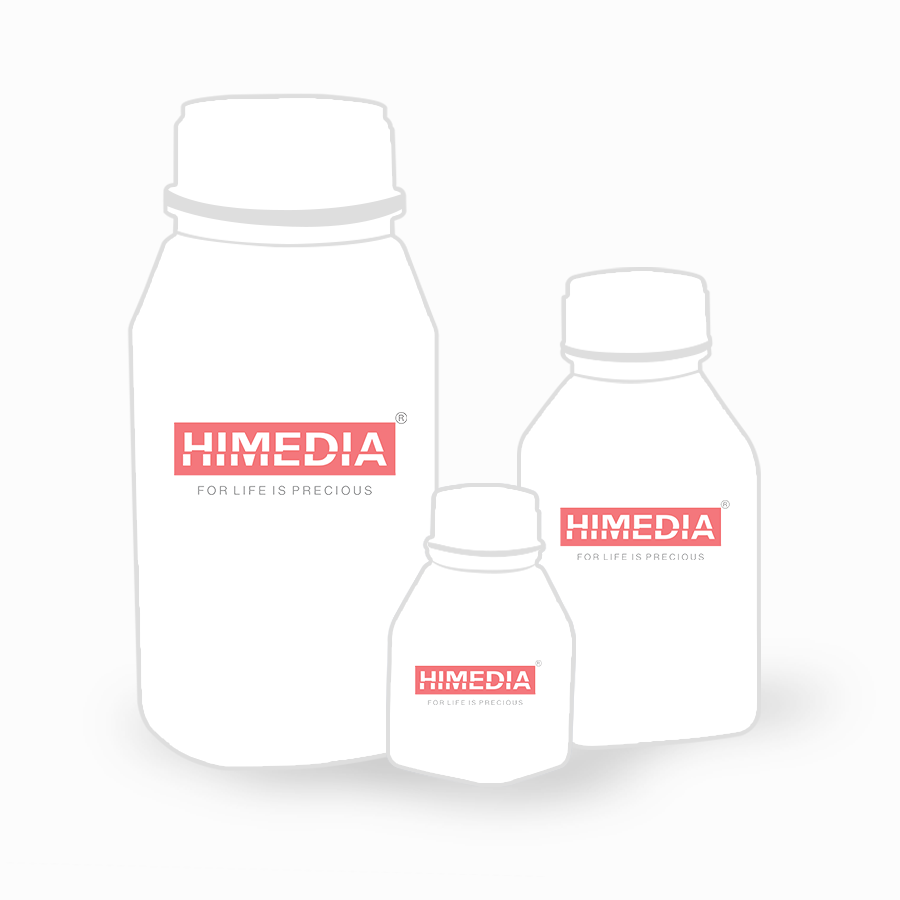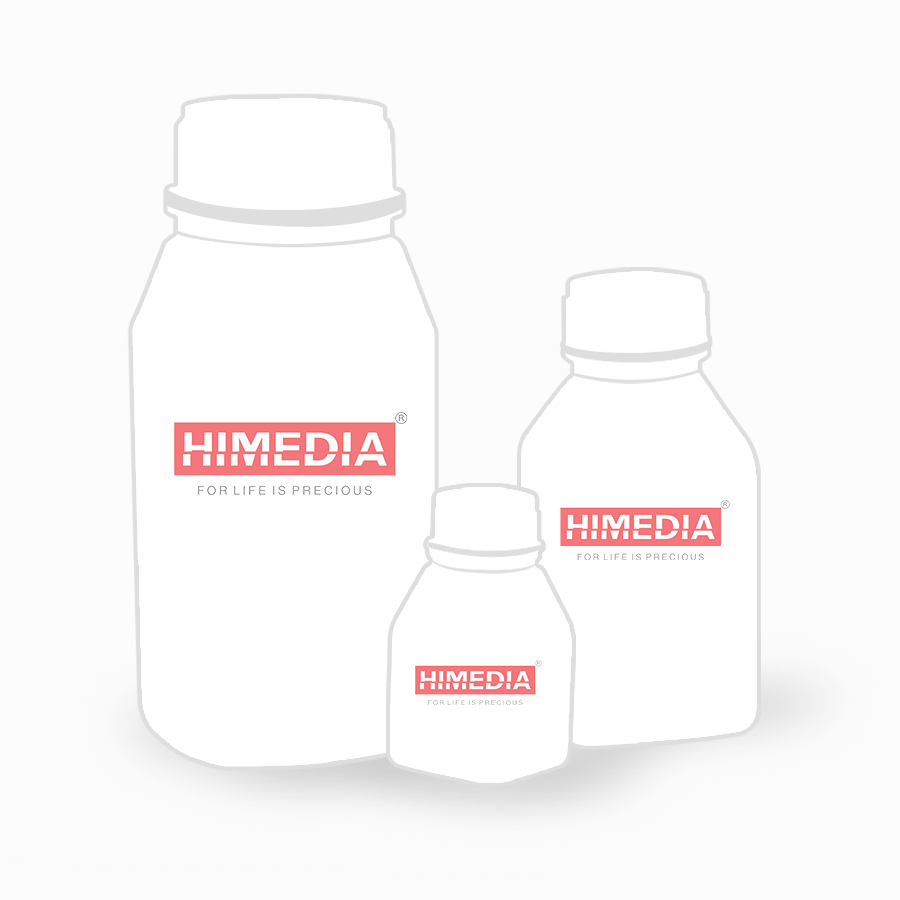 Your enquiry has been submitted
Your enquiry has been submitted
Neutralizing fluid
Intended Use
This medium is recommended for neutralizing the activity of antimicrobial agents in accordance with BP.
Composition**
| Ingredients | Gms / Litre |
|---|---|
| HMC peptone # | 1.000 |
| Lecithin (egg) | 3.000 |
| Histidine hydrochloride | 1.000 |
| Sodium chloride | 4.300 |
| Potassium dihydrogen phosphate | 3.600 |
| Disodium hydrogen phosphate, dihydrate | 7.200 |
**Formula adjusted, standardized to suit performance parameters # Equivalent to Peptone (meat or casein)
Directions
Suspend 18.64 grams (the equivalent weight of dehydrated medium per litre) in 1000 ml purified/distilled water containing 30 grams of Polysorbate 80. Heat if necessary to dissolve the medium completely. Dispense into tubes or flasks as desired. Sterilize by autoclaving at 15 lbs pressure (121°C) for 15 minutes.
Principle And Interpretation
Neutralizing fluid is used to neutralize the activity of antimicrobial agents generally present in pharmaceutical materials(1). This is required to neutralize the effect of antimicrobials while testing the sterility of such materials. This medium may be added to Buffered Sodium Chloride Peptone Solution, pH 7.0 before sterilization. If utilized their efficacy and non-toxicity towards microorganisms are demonstrated (1).
The neutralizing agents present in the medium neutralizes the activity of antimicrobial agents present in various pharmaceutical products which may interfere with microbial limit tests or sterility testing analysis. HMC peptone provides carbon, nitrogen compounds, vitamins, minerals and other essential growth nutrients. Egg lecithin and polysorbate 80 act as neutralizing agents. Histidine hydrochloride is the source of amino acid. Sodium chloride maintains osmotic equilibrium and phosphates serve as buffering agents.
Type of specimen
Pharmaceutical samples
Specimen Collection and Handling
For pharmaceutical samples, follow appropriate techniques for sample collection, processing as per pharmaceutical guidelines (1). After use, contaminated materials must be sterilized by autoclaving before discarding.
Warning and Precautions
Read the label before opening the container. Wear protective gloves/protective clothing/eye protection/face protection. Follow good microbiological lab practices while handling specimens and culture. Standard precautions as per established guidelines should be followed while handling clinical specimens. Safety guidelines may be referred in individual safety data sheets.
Limitations
- Biochemical characterization is necessary to be performed on colonies from pure cultures for further identification.
Performance and Evaluation
Performance of the medium is expected when used as per the direction on the label within the expiry period when stored at recommended temperature.
Quality Control
Appearance Cream to yellow homogeneous free flowing powder
Colour and Clarity of prepared medium Colourless to pale yellow opalescent solution in tubes
Reaction Reaction of 1.86% w/v aqueous solution at 25°C.
Cultural Response
Cultural characteristics observed when subcultured on Tryptone Soya Agar (M290), after an incubation at 35-37°C for 40-48 hours.
| Organism | Inoculum (CFU) | Growth |
|---|---|---|
| Bacillus subtilis subsp. spizizenii ATCC 6633 (00003*) | 50-100 | good |
| Escherichia coli ATCC 8739 (00012*) | 50-100 | good |
| Pseudomonas aeruginosa ATCC 9027 (00026*) | 50-100 | good |
| Staphylococcus aureus subsp. aureus ATCC 6538 (00032*) | 50-100 | good |
| Salmonella Typhimurium ATCC 14028 (00031*) | 50-100 | good |
Key: (*) Corresponding WDCM numbers
Storage and Shelf Life
Store between 10-30°C in a tightly closed container and the prepared medium at 15-25°C. Use before expiry date on the label. On opening, product should be properly stored dry, after tightly capping the bottle in order to prevent lump formation due to the hygroscopic nature of the product. Improper storage of the product may lead to lump formation. Store in dry ventilated area protected from extremes of temperature and sources of ignition Seal the container tightly after use. Product performance is best if used within stated expiry period.
Disposal
User must ensure safe disposal by autoclaving and/or incineration of used or unusable preparations of this product. Follow established laboratory procedures in disposing of infectious materials and material that comes into contact with sample must be decontaminated and disposed of in accordance with current laboratory techniques (2,3).
Reference
- The British Pharmacopoeia, 2022, Medicines and Healthcare products Regulatory Agency.
- Isenberg, H.D. Clinical Microbiology Procedures Handbook. 2nd Edition.
- Jorgensen, J.H., Pfaller, M.A., Carroll, K.C., Funke, G., Landry, M.L., Richter, S.S and Warnock., D.W. (2015) Manual of Clinical Microbiology, 11th Edition. Vol. 1.
| Product Name | Neutralizing fluid |
|---|---|
| SKU | M1420B |
| Product Type | Regular |
| Physical Form | Powder |
| Origin | Animal |
| Packaging type | HDPE |
| References | 1. British Pharmacopoeia, 2004, The Stationery office British Pharmacopoeia |
| Customized Product Available | No |






